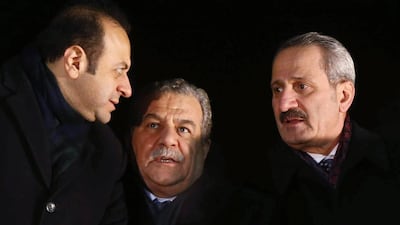ANKARA // Three Turkish cabinet ministers resigned on Wednesday in a sweeping corruption and bribery scandal that has targeted the allies of Prime Minister Recep Tayyip Erdogan.
After announcing his own resignation the environment minister, Erdogan Bayraktar, raised the stakes by calling on Mr Erdogan to follow suit.
“I am stepping down as minister and lawmaker,” Mr Bayraktar told NTV. “I believe the prime minister should also resign.”
Mr Bayraktar’s comments were the first direct challenge the Mr Erdogan has faced from a minister in his own Justice and Development Party (AKP).
Fellow AKP members Zafer Caglayan, who was economy minister, and Muammer Guler, the interior minister, also announced they were quitting yesterday.
The sons of both ministers are among the two dozen people who have been charged as part of a wide-ranging bribery and corruption inquiry that has ensnared close government allies and top businessmen.
Mr Bayraktar’s son was also detained last week, but has not been formally charged and has been released pending trial.
Those caught up in the police raids are suspected of numerous offences including accepting and facilitating bribes for development projects and securing construction permits for protected areas in exchange for money.
Mr Caglayan’s and Mr Guler’s sons, along with the chief executive officer of the state-run bank Halkbank, are among 24 people who have been arrested on bribery charges.
Media reports said police have seized US$4.5 million (Dh16.52m) in cash that was stashed in shoe boxes in the home of the bank’s CEO, while more than $1m in cash was reportedly discovered in the home of Mr Guler’s son, Baris.
Mr Erdogan, who has led Turkey since 2002 as the head of a conservative government, has described the inquiry as “a smear campaign” to undermine Turkey’s ambitions to become a major political and economic power.
In a televised speech on Wednesday, he did not comment on the ministers’ resignations but spoke of a “a conspiracy” from “international powers” and insisted the AKP had a clear record.
Observers say the investigation has exposed a rift between Mr Erdogan and former ally Fethullah Gulen, a Muslim cleric who lives in the United States and whose movement wields considerable influence in Turkey’s police and judiciary.
The damaging investigation also comes ahead of crucial local elections in March and presidential elections in August.
Mr Bayraktar said the vast majority of construction projects mentioned in the investigation were carried out with the premier’s approval.
“It’s the prime minister’s natural right to work with or remove whichever minister he would like to,” he told NTV.
“But I don’t accept any pressure to resign over an operation involving bribery and corruption ... because a big majority of construction plans in the investigation dossier were carried out with the approval of the prime minister.”
The television network then cut the live feed in a move that immediately raised a stir on Twitter, with critics slamming it as censorship.
Mr Erdogan, who has responded to the investigation by sacking dozens of police chiefs, is expected to reshuffle his cabinet shortly in light of the corruption controversy.
Mr Caglayan kept up the government’s defiant stance in his resignation statement, declaring that the investigation was “clearly a hideous plot against our government, our party and our country”.
“I am stepping down from my post as economy minister so that this ugly game targeting my close colleagues and my son will be spoiled and the truth will be revealed,” he said.
MrGuler simply told the state-run Anatolia news agency: “I offered my resignation to the prime minister on December 17 and today I conveyed it in writing.”
The leader of the main opposition Republican People’s Party (CHP), Kemal Kilicdaroglu, who called for the government’s resignation as soon as the scandal erupted, said the ministers’ decision to quit came “too late”.
Thousands of protesters took to the streets of Istanbul last week also calling on the government to step down.
Mr Gulen has denied being behind the controversial investigation. His reported dispute with Mr Erdogan is thought to be linked to government plans to shut down a network of Gulenist schools, a major source of revenue for the group.
Gulenists were previously key backers of the AKP, helping it to win three elections in a row since 2002.
Turkey’s local elections on March 30 are now being seen as a key indicator of where the political fault-lines lie throughout the country.
Agence France-Presse with additional reporting by Associated Press

